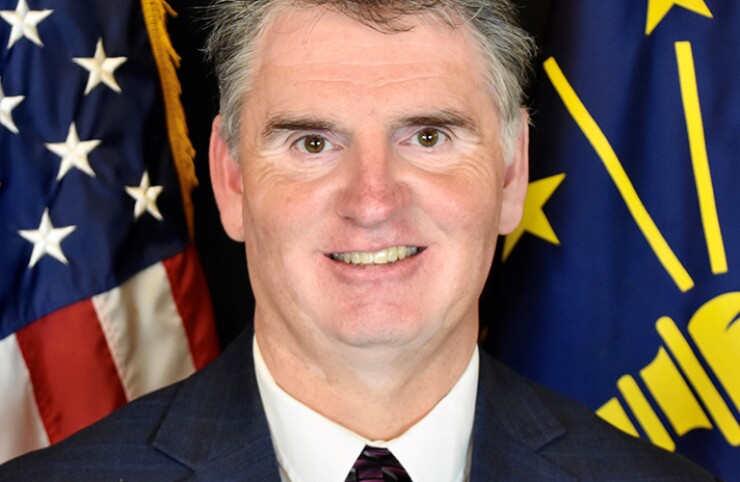ESG battles flaring in the Midwest
December 26, 2024

Indiana Treasurer of State
The battle over ESG investing is spreading in the Midwest, with the recent passage of an Ohio law barring state pension funds from investing based on environmental, social and governance factors and a Dec. 13 decision by the Indiana Public Retirement System (INPRS) to dismiss BlackRock from managing its assets due to concerns over the firm’s ESG commitments.
“We’ve seen this in other states,” said Jeff Eller, spokesman for the Alliance for Prosperity & a Secure Retirement, a Delaware-based nonprofit that advocates policies that expand access to retirement solutions. “An analysis conducted by the University of Central Oklahoma on behalf of the Oklahoma Rural Association found Oklahoma’s [anti-ESG] law had cost the state’s taxpayers, municipalities and businesses an estimated $185 million and was adding $11 million per month to that total while in effect.”
Another recent study by the Chicago Federal Reserve and the Wharton School found bond issuers in Texas would incur $300 million to $500 million in additional interest on $31.8 billion of debt sold during the first eight months after two anti-ESG laws took effect there.
Eller said if the INPRS board stops prioritizing low fees and effective asset management — both of which INPRS staff reportedly acknowledged BlackRock had provided, according to the Alliance — “taxpayers will be left to foot the bill.”
Such battles are more entrenched in the Southwest, where not only Texas but also Oklahoma and Kansas have passed anti-ESG laws, and the Southeast, where Arkansas, Florida, Louisiana, Georgia and North Carolina have passed such laws, according to the Anti-ESG Bill Tracker from Pleiades Strategy.
The Texas attorney general this month ended a review of Wells Fargo that had called into question its ability to underwrite governmental bonds in the state after the institution withdrew from the Net-Zero Alliance, a United Nations-convened group of banks and financial firms that have signed up to align their financing activities with the goal of net-zero greenhouse gas emissions by 2050.
Meanwhile, Oklahoma’s attorney general announced earlier this month that he is appealing a state district court’s ruling against Oklahoma’s anti-ESG law, which bans large state and local government contracts with companies said to be “boycotting” the fossil fuel industry.
A federal judge struck down Missouri’s nascent attempt at anti-ESG rules in August, which Secretary of State John R. Ashcroft had enacted after anti-ESG legislation fell short in the state capital.
More than two dozen other anti-ESG bills proposed in the last two years in Illinois, Indiana, Iowa, Minnesota, Nebraska and North Dakota are all now dead, according to the Anti-ESG Bill Tracker.
Michigan’s HB 4344, HB 4381 and HB 5310 are all currently in committee. They would ban state contracts with entities engaged in economic boycotts; ban the consideration of social, political or ideological goals by the public employee retirement system asset manager; and ban state contracts with financial institutions that boycott firearms dealers and manufacturers, fossil fuel producers, agriculture or timber companies, respectively.
“Across the country, many states are pushing back against ESG investing,” Abhilash Reddy, chief of staff for Indiana State Treasurer Daniel Elliott, told The Bond Buyer. “Treasurer Elliott is a leader in that fight and draws inspiration from his fellow financial officers while providing an example of how to fight for his state’s public servants.”
The INPRS board of trustees unanimously relieved BlackRock of its asset management duties after the state treasurer and the secretary of state both publicly criticized the firm for its commitment to ESG principles.
Reddy said the treasurer has a duty under state law to examine asset managers “and report to the INPRS board whether they’ve violated the state provisions on ESG within Indiana’s pension system.”
The law Reddy was referring to says the treasurer shall provide the names of any service providers making ESG commitments and offer evidence of such commitments to the INPRS board, which is barred from ESG-related investment decisions or making ESG commitments with system assets.
Reddy added, “There are a multitude of studies and articles that the treasurer would cite that question the effectiveness of ESG investing and the rating system used to guide ESG investing. These sources include the Harvard Business Review and Bloomberg.”
Elliott told local radio station WIBC he had created a list of companies working with the state pension system that support ESG principles, and “the first one happened to be BlackRock.”
Elliott accused BlackRock of investing the pension system’s assets “based on their political views, rather than … what’s the best rate of return” on investment.
“You have these woke corporations who are dictating how people should invest,” he said. “You have these folks from New York City and Europe and California dictating how Hoosiers’ investments should be invested. And that’s a problem.”
“We’re proud of having helped hundreds of thousands of Indianans invest and retire with dignity,” BlackRock said in a statement after the vote. “Despite this decision, we remain committed to Indiana and the $102 billion we have invested in the state on behalf of our clients.”
According to the Indiana Capital Chronicle, Secretary of State Diego Morales’ August cease and desist letter to BlackRock, which accused it of securities fraud, closely resembled a letter from the Mississippi secretary of state earlier this year.
BlackRock argued in a statement then that it would never make commitments that constrained its ability to invest its clients’ money as they wished.
“[This] action by Mr. Morales is a politically motivated attack that completely mischaracterizes BlackRock’s approach to investing,” the firm said. “We are only focused on helping hundreds of thousands of Hoosier clients achieve their investment goals. We intend to defend ourselves and our clients against this arbitrary use of state power.”
Indiana State Comptroller Elise Nieshalla, who voted with Elliott to terminate BlackRock’s role and pursue an alternative asset manager, said in a statement after the vote, “I do commend BlackRock’s recent action to discontinue its affiliation with Climate Action 100+, but more needs to be done, including ending its support of Net Zero and similar initiatives, to demonstrate a refocused commitment of prioritizing beneficiaries over a political agenda.”
The Alliance’s Eller noted, INPRS testified in 2023 that it did not invest according to ESG principles and had updated its policies to emphasize fiduciary duty and maximizing returns.
He also pointed to a comment made by Cris Johnston, then-Governor Eric Holcomb’s budget director, during the INPRS board meeting: “It seems like the law is not allowing INPRS to live up to the spirit of its fiduciary responsibility.”
In Ohio, Senate Bill 6 just became law. The Texas Public Policy Foundation, the Ohio Coal Association and the Ohio Oil & Gas Association, and others, testified for it, while it drew opposition from groups like Green America, the Ohio Federation of Teachers and Ceres Global.
The text of the bill stipulates that the boards of the state retirement systems, the Bureau of Workers’ Compensation and state universities “shall not make an investment decision with the primary purpose of influencing any social or environmental policy or attempting to influence the governance of any corporation.”
The bill’s primary sponsor, state Sen. Kirk Schuring, passed away earlier this year. His colleague Sen. Jerry Cirino, R-Kirtland, who testified in favor of the legislation, did not respond to a request for comment by press time.
Gov. Mike DeWine signed the legislation last Thursday.
Search
RECENT PRESS RELEASES
Related Post



